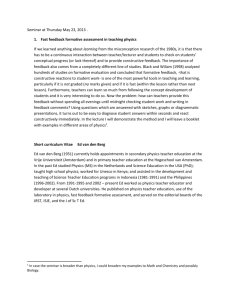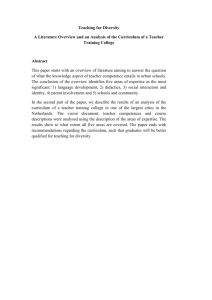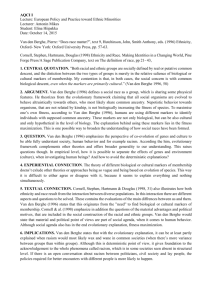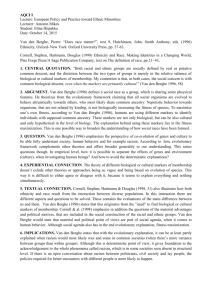South African soprano Elza van den Heever as Ellen Orford….. a
advertisement
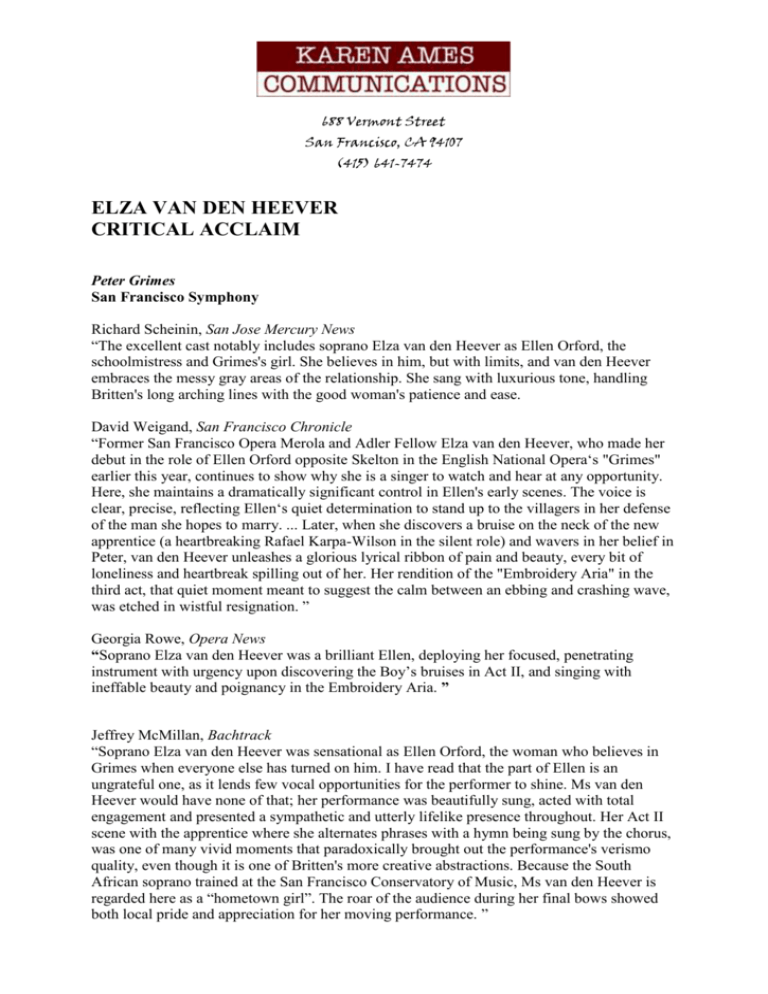
688 Vermont Street San Francisco, CA 94107 (415) 641-7474 ELZA VAN DEN HEEVER CRITICAL ACCLAIM Peter Grimes San Francisco Symphony Richard Scheinin, San Jose Mercury News “The excellent cast notably includes soprano Elza van den Heever as Ellen Orford, the schoolmistress and Grimes's girl. She believes in him, but with limits, and van den Heever embraces the messy gray areas of the relationship. She sang with luxurious tone, handling Britten's long arching lines with the good woman's patience and ease. David Weigand, San Francisco Chronicle “Former San Francisco Opera Merola and Adler Fellow Elza van den Heever, who made her debut in the role of Ellen Orford opposite Skelton in the English National Opera‘s "Grimes" earlier this year, continues to show why she is a singer to watch and hear at any opportunity. Here, she maintains a dramatically significant control in Ellen's early scenes. The voice is clear, precise, reflecting Ellen‘s quiet determination to stand up to the villagers in her defense of the man she hopes to marry. ... Later, when she discovers a bruise on the neck of the new apprentice (a heartbreaking Rafael Karpa-Wilson in the silent role) and wavers in her belief in Peter, van den Heever unleashes a glorious lyrical ribbon of pain and beauty, every bit of loneliness and heartbreak spilling out of her. Her rendition of the "Embroidery Aria" in the third act, that quiet moment meant to suggest the calm between an ebbing and crashing wave, was etched in wistful resignation. ” Georgia Rowe, Opera News “Soprano Elza van den Heever was a brilliant Ellen, deploying her focused, penetrating instrument with urgency upon discovering the Boy’s bruises in Act II, and singing with ineffable beauty and poignancy in the Embroidery Aria. ” Jeffrey McMillan, Bachtrack “Soprano Elza van den Heever was sensational as Ellen Orford, the woman who believes in Grimes when everyone else has turned on him. I have read that the part of Ellen is an ungrateful one, as it lends few vocal opportunities for the performer to shine. Ms van den Heever would have none of that; her performance was beautifully sung, acted with total engagement and presented a sympathetic and utterly lifelike presence throughout. Her Act II scene with the apprentice where she alternates phrases with a hymn being sung by the chorus, was one of many vivid moments that paradoxically brought out the performance's verismo quality, even though it is one of Britten's more creative abstractions. Because the South African soprano trained at the San Francisco Conservatory of Music, Ms van den Heever is regarded here as a “hometown girl”. The roar of the audience during her final bows showed both local pride and appreciation for her moving performance. ” Stephen Smoliar, Examiner.com The only really sympathetic character is the widow and schoolmistress Ellen Orford, sung by soprano Elza van den Heever. She has a personal ethic that sees good in everyone and tries to mine that good from Grimes’ dark exterior. Van den Heever’s interpretation penetratingly disclosed the intensity of her motives, suggesting that her understanding of the children she taught was her primary asset in dealing with the adults she had to face every day. Anna Bolena Grand Théâtre de Bordeaux Gilles Charlassier, Concerto Net “The South African soprano shone on stage this evening. With a good grip on the vocality of the role, she brings the deep expressiveness and richness this rich and complex character needs, and the strong low-lying passages allow her to express her dramatic intensity. True to the intentions of the composer, the repudiated and dethroned queen is vibrant with admirable nuances and life.” Greame Feggetter, Opera Magazine “Marie-Louise Bischofberger’s new production of Anna Bolena at the Grand Théâtre was dominated by Elza van den Heever’s assumption of the title role (June 5). As her troubles mounted, Anna grew in stature, proudly defiant in the face of her humiliation. Vocally, the soprano rose to the bel canto challenge, producing some gloriously burnished phrases and giving a flawless account of the coloratura passages. Classiquenews.com Elza van den Heever in the title role brings back excellent memories of… Giuditta Pasta (the singer who created the role) thanks to her stage presence, the dramatic strength of her gestures and the imposing and proud humanity she represents. This is a distraught, beautiful, appassionata, sincere Anna Bolena, who captivates the audience with her vocal and theatrical talents. Stephen J. Mudge, Opera News “Vocally, van den Heever was mightily impressive, managing the nostalgic melismas with supple tenderness and rising to her very best when flashing outrage at being judged for her supposed crimes. Her glowingly healthy soprano has a gleaming dramatic edge and she eschews coloratura fireworks in favour of firm, direct expression…” Forum Opéra The crowning of Elza van den Heever: … Anna Bolena is a punishing and demanding title role. Can Elza van den Heever claim this crown, she who on the same stage has already sung Alcina, Leonora in Il Trovatore, the Composer in Ariadne auf Naxos and, in New York, Elisabetta in Maria Stuarda, another Donizzetian queen of high lineage? At the end of a performance which is almost a feat, the answer is so obvious that, like the person sitting to our right, we wanted to scream out bravos until we lost our voices. It was not only a vocal feat, but also a fabulous acting performance. First and foremost, Elza van den Heever moves us deeply, enthrals and captivates us with a portrayal which is totally in keeping with the emotional struggle and suffering of the wife of Henry VIII. The road, strewn with hardship, ends with a mad scene that the performer makes gentle, bitter and then wild. Before that, the proud queen, the abandoned wife, the repentant lover, the betrayed yet merciful friend and the tender mother all showed their true colours. In the quest for dramatic truth, she delighted us with her powerful and controlled voice, with a splendid midrange that does not exclude dazzling high notes. But those extreme notes are never sung without purpose; they are used to convey meaning, in the same way as volume or colour offer expression. The figures of style or systematic searches for effects that some overplay to mask the lack of depth of their instrument are not needed when the flame burns with the force of expression alone. Catherine Darfay, Sud Ouest “Naturally, it is the women who triumph. Keri Alkema (Jane) and Elza van den Heever (Anna) are blessed with identically sensual voices which lend particular intensity to their duet during the second act. But the regal bearing of Elza van den Heever, the incisive delivery she is capable of (“Giudici ad Anna”) along with her impressive range and sumptuous phrasing, reach a superb peak in the mad scene, with an “al dolce guidami” that could make stones weep.” Peter Grimes English National Opera Russ McDonald, Opera Magazine “Elza van den Heever, the South African soprano making her London debut, is good news indeed. Familiar to many from her Elisabetta in the Met’s HD Maria Stuarda, she was here transformed into a slightly frumpy Ellen Orford, tender-hearted obviously, but no simpleton. Her soprano seems to be a large lyric with considerable dramatic potential, not conventionally beautiful but mostly even and able to soar over the chorus. Her Embroidery aria and lines in the duets and ensembles were delicate and affecting.” Rupert Christianse, The Telegraph “Elza van den Heever, a superb South African soprano who looks and sounds remarkably like the young Joan Sutherland, stands out from the herd as a stolid and sensible Ellen Orford, with a voice of angelic sheen and purity promising hope and redemption. Mark Berry, Seen and Heard International “…It did no harm, of course, to have …….an Ellen Orford as ….compassionate and as silvery-toned …..a revelatory portrayal.” David Benedict, The arts desk.com “In her UK debut, Elza van den Heever’s beautifully forbearing Ellen Orford is all the more touching for the breadth of her vocal and dramatic range. She’s even granted a rare moment of happiness, tossing her hat delightedly in the air at the Sunday morning sunshine.” Barry Millington, London Evening Standard “….Ellen is strongly sung by Elza van den Heever, feisty and compassionate rather than angelic.” Mark Valencia, WhatsOnStage.com “South-African soprano Elza van der Heever, whose sublimely ringing Ellen is a joy, nails the desperation behind the dowdy tenderness.” George Hall, TheStage.com “South African soprano Elza van den Heever as Ellen Orford….. a role she seems to inhabit dramatically while singing it peerlessly.” William Hartston, Express “Several elements of this production, directed by David Alden, make it something quite special. First there are the performances in the two leading roles of Stuart Skelton as Grimes and Elza van den Heever as Ellen Orford, the widow and schoolmistress who is the only person in the Borough prepared to support Grimes… I am still unconvinced about the merits of Britten as a composer, but the combination of Skelton, van den Heever, Alden and Gardner really is a five-star production of a three star opera.” Metro Blog “Elza van den Heever is vocally and dramatically knockout” Helen Wallace, Classical-Music.com “Ellen Orford’s naive intention to protect the apprentice John, while being complicit in endangering him, is made believable by Elza van den Heever’s poignant, youthful ardour (an auspicious debut for this young South African soprano). Caught between Grimes’s temper and Auntie’s lust, she’s never seemed so vulnerable.” Maria Stuarda Metropolitan Opera Anthony Tommasini, The New York Times “In a notable Met debut, Elza van den Heever, a 33-year-old South African soprano whose career is rising internationally, is a vocally burnished and emotionally tempestuous Elizabeth (Elisabetta)…her voice has penetrating depth and character. She turns flights of coloratura passagework into bursts of jealousy and defiance as Elizabeth contends with the threat that Mary, a blood relative, poses to her reign in England… I admired the rawness and vulnerability of Ms. van den Heever’s performance. She was so committed to this role that she shaved her head, the better to accommodate the queen’s elaborate wigs. And her bright, intense voice sliced through the orchestra whenever the queen’s ire was provoked.” Heidi Waleson, The Wall Street Journal “Ms. van den Heever, making her company debut, has a big, well-controlled soprano. It is steely and assertive, with the flexibility to pull off Elizabeth’s vengeful, vitriolic cabalettas. She conveyed both Elizabeth’s autocratic demeanor and the underlying effort required to maintain that façade.” Mike Silverman, Associated Press “Of course, it takes two to stage a confrontation, and DiDonato's partner at the Met is Elza van den Heever, a South African soprano making her debut. She has a voice that's impressive in many respects, with a large and vibrant upper register.” David Patrick Stearns, WQXR “In her Met debut, Elza van den Heever was a suitably imposing Queen Elizabeth…hers was a complete characterization that included a man-ish gait suggesting the queen was her own unique gender, and dismissing her reflection in the mirror after being dressed.” Catherine Jordy, Forum Opéra “Vocally, the divas' rivalry is rather even, with a small advantage for Elza van den Heever, a regal and distant Elisabetta. The abundant beauty in her vocal line, her great and obvious facility, and her palpable dramatic power are in unison with her performance as an exceptional actress. Her professionalism and suitability for the role are not merely vocal: the diva shaved her head for the occasion, which of course facilitated her changing into different wigs but which nevertheless represented a genuine sacrifice in order to accentuate the very high forehead of this historic queen on whom Ms. van den Heever superimposed herself remarkably.” Il Trovatore Canadian Opera Company James Karas, Bach Track “The singing kudos goes to South African soprano Elza van den Heever as Leonora. She has a good stage presence and gives us a lovely and tortured heroine. She achieves controlled fragility and vocal splendour. When she sings pianissimo and you are afraid that her voice may crack, it takes wings and slowly soars with indelible beauty. It’s like a white dove slowly opening its wings and rising towards the sky. She can be dramatic as well and gives a wellrounded performance of the first order.” Richard Ouzounian, The Star “Elza van den Heever. Remember that name. The South African soprano makes her COC debut here and will be making her Metropolitan Opera debut at the end of the year. Her performance as the piece’s tragic heroine, beloved of two brothers who are also sworn enemies, hit all of the emotional touchstones the part requires: vulnerability, ecstatic love and heart-rending despair. From the opening notes of “Tacea la notte placida,” it was obvious we were in the hands of a singer for whom delicacy and power are not mutually exclusive. There is also a welcome spontaneity in her acting, which made that difficult toboggan ride of the opera’s penultimate scene, where she hurtles through some of the plot’s more melodramatic turns, something to be believed and cherished.” John Coulbourn, Toronto Sun “Soprano Elza van den Heever, meanwhile makes a worthy object of both their affections, giving lustrous depth to the steadfast and constant Leonara.” Erin Lucuik, Plaid Magazine “While all of the leads give strong performances in the Canadian Opera Company’s (COC) production of Il Trovatore, standouts include South-African soprano Elza van den Heever as Leonora, whose delivery runs the gamut of emotions with great success.” Robert Harris, The Globe and Mail “Her counterpart, South African soprano Elza van der Heever, playing Leonora, appearing here just months before her Met debut, is a Verdi singer with a difference. She wins over her audience not with megawatt power but with a lyrical clarity and agility to her voice that is immensely dramatic and touching. Verdi wrote a fourth Act for Trovatore that is virtually a series of solo pieces for Leonora, and van der Heyer’s touching heartbreak in her aria, D’amor sull’ali rosee, was one of the highlights in an evening full of highlights.” Joseph So, La Scena Musicale “At the risk of being a little irreverent, the opulent soprano of Elza van den Heever reminds me of a luxury sedan, say the Mercedes S550. As a passenger/listener you are cushioned in velvet, the ride is like floating on air. Given its V8 engine, it's big and has plenty of power in reserve, which is unleashed at the right moment, but most of the time it's kept in check. The top is free and easy, and on this occasion, the soprano threw in several interpolated high Cs in Act 4. The voice is at its best in cantilena, particularly D'amor sull'ali rosee and Tacea la notte placida, both sung with nice legato and lovely high pianissimos, including a piano high C in each aria.“ Michael Johnson, Concerto Net “Elza van den Heever as Leonora has a steady, youthful voice that manages the soft singing in a truly dreamlike manner. She also voices the melancholic colours with which Verdi imbued the role.” Sarah Chan, The Scene in TO “Individually, Elza van den Heever as Leonora has a voice that sends heartbreaking chills down one’s spine. You can close your eyes and still feel the pain evoked through the devastating emotion delivered through voice alone.” Brian Hay, No Rules – No Lights “Elza van den Heever displayed stunning vocal agility and breathtaking range to make the passion and devotion of the character of 'Leonora' ignite the stage. The pure beauty of her voice and her wonderful delivery created moments that were heart-rending.” Colin Eatock, Colin Eatock.com “At the performance I heard (the opera’s third night, on Friday, October 5), Elza Van Den Heever’s Leonora pretty much stole the show. Vocally, she has everything anyone could want from a Verdi soprano: strength, brightness, agility, solid intonation, beautiful phrasing, either sweetness of tone or a dramatic edge (depending on what’s needed), and just enough vibrato to bring every note to life.” Alcina Opéra National de Bordeaux José Ma Irurzun, Seen and Heard International “South African soprano Elza van den Heever played Alcina. She is an important soprano of our times, a lyric-spinto, and she has a great future ahead of her...Elza van den Heever was an exciting Alcina, more powerful than moving, and at her best in the more dramatic moments.” Christophe Rizoud, ForumOpera“The strength of her voice impresses as much as her ability to master the volume, imperceptibly, as one reduces or increases the flow of a faucet. The long laments with which, thread by thread, Handel wove the captivating portrait of his heroine seem devised for this radioactive soprano with inexhaustible breath. Or at least Elza van den Heever knows how to give the impression that these sublime arias were written for her.” Catherine Darfay, SudOuest “Elza van den Heever is a superlative Alcina, for the voluptuous curve of her voice, the incandescent incarnation (seizing “Ah mio cor”) and the development she shapes of the sorceress’ character, never the same from one air to the next.” Mehdi Mahdavi, Altamusica “Elza van den Heever’s Alcina is supernatural. Vocally, she exceeds anyone that could be heard in this role today…. She masters the bel canto vocabulary with an extreme concentration of timbre and inexhaustible dynamics. Above all, her pure emotional engagement rounds off with a staggering “Ah! mio cor” fueled by the tension of a blazing middle section.” Rinaldo Lyric Opera of Chicago Anthony Tommasini, The New York Times “As Armida, the bright-voiced, fearless soprano Elza van den Heever stole every scene she was in, especially the end of Act II, in which the thwarted Armida sings a fiery aria of defiance, “Vo’ far guerra.” John von Rhein, Chicago Tribune “South African soprano Elza van den Heever, in a triumphant debut rages through her impossibly florid showpiece, “Vo' far guerra,” while mimicking at a giant harpsichord the virtuoso flourishes we are hearing from Jory Vinikour, an actual harpsichordist, in the pit. The agility and projection of Van den Heever's singing are thrilling, and she makes a hilarious comedienne as she rages against the men in her life.” George Loomis, Financial Times “As the sorceress Armida, Rinaldo’s opponent and would-be lover, Elza van den Heever sings with determination and vocal resonance.” Mike Silverman, The Huffington Post (Associated Press) “The revelation of the night was South African soprano Elza van den Heever as Armida. Blessed with a plush, dramatic voice capable of formidable power and dazzling high notes, she also showed herself to be a first-rate comic actress. Her Armida, given to petulance and a fondness for liquor, brought down the house with her Act 2 vengeance aria, which the production turns into a battle of one-upmanship against harpsichordist Jory Vinikour.” Andrew Patner, Chicago Sun-Times “Van den Heever is excellent in everything she does, but especially in Negrin’s greatest scene, a tour de force “Vo’ far guerra” at the end of Act II, where she battles, figuratively and literally, with Vinikour and his harpsichord.” Lawrence A. Johnson, The Classical Review “As the sorceress Armida who captures Almirena, van den Heever made an outstanding local debut. The South African singer possesses a gleaming, powerful soprano as well as daunting agility. Van den Heever stole the show with her vampish diva turn in the showpiece aria Vo’ far guerra.” Mark Thomas Ketterson, Opera News “Most impressive of all was South African soprano Elza van den Heever, who tore through Armida’s pyrotechnical writing with dazzling assurance and unfailingly reminded us that, reformed or not, this lady is trouble.” Nancy Malitz, Chicago on the Aisle “...soprano Elza van den Heever, she of clarion high notes, lightning coloratura and a huge talent for camp” Katy Walsh, Chicago Theater Beat “In the best scene of the show, a fiery Elza van den Heever (Armida) faces off with orchestra. Van Den Heever is perfectly hell-has-no-fury-like-a-woman-scorned in the unforgettable conclusion to the second act. She is diva-licious!” Lori Daner, Chicago Stage Review “Conversely, the earthy humor and sheer vocal power brought to Armida by Miss van den Heever steals every scene in which she takes part. From the first time we encounter the evil sorceress, sweeping down from a mountaintop in her floor length red patent leather coat, to her drunken duel with the harpsichord virtuoso who taunts her from the orchestra pit, to a tussle with Argante on the floor of the Civic Opera House stage that is by turns sensual and hilarious, this diva performance nearly brings down the house.” Betty Mohr, Southtown Star (Chicago Sun-Times) “But, it’s Elza van den Heever who steals the show. Not only does she display a goldenvoiced soprano, but van den Heever has considerable acting skills. When she was on stage, she commanded the opera house.” William, Opera Warhorses “The bravura performance of the evening was without question that of Elza van den Heever’s Armida. Director Negrin, rather than taking Armida’s fantastic aria Vo’ far guerra seriously, unleashed van den Heever’s comic skills. … Van den Heever, another artist whose Mozartean skills I have admired, proved adept at Armida’s vocal fireworks.” Otello Oper Frankfurt Maritta Tkalec, Frankfurter Rundschau “A huge voice with unbelievable capacity for nuance in moments of suffering and passion. Full of tenderness and precision.” Volker Milch, Wiesbadener Kurier “Elza van den Heever offers a Desdemona, which captivates with brilliant euphony in between moving piani and opulence.” Michael Köhler, Deutschlandradio.de “Elza van den Heever was the star of the evening, receiving the most applause – rightly so, as she did not portray Desdemona as a mere passive soul, rather with dramatic intensity, particularly in the scene with Otello in the beginning of the third act...” Axel Zibulski, Offenbach Post “Elza van den Heever gives a stellar performance, and is singing her way to the world’s best: her warm, full, sonor and cultivated soprano is a treat for the ears.” Axel Zibulski, Frankfurter Neue Press “Elza van den Heever as Desdemona is a ray of light. Her warm and cultivated soprano, especially in key dramatic moments is a discovery... ...the Willow Song, her Ave Maria before Otello’s murder in the last act...moving beauty and introspection.” Eckhard Britsch, Mannheimer Morgen “Elza van den Heever is entitled to be celebrated as Desdemona…with her timbre and brilliant vocal technique, she sheds light on all the emotional facets of this figure with moving interpretation.” Don Giovanni Hamburgischer Staatsoper Werner Theurich, Spiegel Online "The ladies were even more wonderful, especially the Donnas. Anna (Elza van den Heever) shined with subtly led high notes and a beaming power as well as with finely tuned sentiment in between rage and disappointment - a shining, erotic ex-lover." Così fan tutte Opéra national de Paris Hermine Ferrand, Classiqueinfo “At the beginnings of a career that will no doubt be most prestigious, Elza van den Heever has all the sensibility required for the part, and a beautiful legato.” Marcel Quillévéré, Forum Opera “This young South African singer...has the ideal voice for the great works of Mozart and Strauss. Her ‘Come scoglio’ is of a deeply moving nobility as her voice flourishes, from lower to upper registers, with astounding ease...The deep phrase of ‘Per pietà’, in the second act, also unfolds in a most composed manner as Elza van den Heever never pushes this register. She allows it to flourish, emanating superb emotion!” Mark Berry, Seen and Heard International “Elza van den Heever started off very well as Fiordiligi, her ‘Come scoglio’ was well dispatched, with admirable firmness of tone, necessary to the crucial element, sadly unappreciated by most stage directors, of seria parody.” Il trovatore Bordeaux, Grand Théâtre Emmanuel Andrieu, Concertonet “The triumph of the evening is South-African soprano Elza van den Heever’s spellbinding Leonora. First heard here in 2008 in the role of Elettra (Idomeneo) and most recently as the Composer (Ariadne auf Naxos), her role debut as Leonora will be long remembered here. Endowed with a true Verdian spinto voice, so rarely heard today, she suggests a timbre of endless possibilities. She delivers with equal effortlessness both the rapid cabalettas and the long, Bellini-esque phrases. In addition to a faultless vocal technique, she boasts a masterful top, sensuous bottom, and rich middle range, all seamlessly integrated. Her acting ability does not disappoint: a magnetic presence combined with dramatic flair and ever-present dignity are alternately electrifying and deeply moving. All in all, a genuine great talent to watch (perhaps someday the Elena of one’s dreams in a future Vespri siciliani!).” Catherine Darfay, Sud Ouest “Elza van den Heever’s Leonora is a triumph. With voluptuous tone and luxurious vocal line, she personifies the character’s innocence and fervor. Her “Tacea la notte” quivers long afterwards.” Mehdi Mahdavi, Altamusica Birth of a great Verdi soprano “….the vocals sizzle thanks to a quartet of voices dominated by the magnetic Leonora of Elza van den Heever... Elza van den Heever displays her considerable talents as Leonora. Already, her Composer in last February’s Ariadne auf Naxos on this stage established the breadth of her abilities. It’s evident that a great Verdian soprano is born... … the depth of her tone seemed infinite, and the agility and dynamic power of her voice both effortless and bold...What’s more, her fervent singing is matched by her magnetic presence.” Ariadne auf Naxos Opéra National de Bordeaux Nicole Duault, Altamusica “South African soprano Elza van den Heever, who we will soon hear in Paris as Fiordiligi in Mozart’s Così fan tutte, owned the role of the Composer. She was as vehement as she was warm.” Catherine Darfay, Sud Ouest “Elza van den Heever was a fervent and desperate Composer. The rich harmonies of her voice enhanced the role even more.” Christophe Rizoud, Forum Opéra “Elza van den Heever gradually revealed her incandescent soprano voice. The metamorphosis of her voice evolved with her character to create an unforgettable interpretation...once the lights came back on the audience remained seated, motionless and stunned.” Jean-Claude Meymerit, Paysud “The Composer was beautifully played and sung by Elza van den Heever...this Composer has a remarkable voice and a strong presence.” Strauss: Four Last Songs with the San Francisco Symphony, conducted by Michael Tilson Thomas Joshsua Kosman, San Francisco Chronicle “Van den Heever has consistently brought tonal luster and enormous eloquence to a range of repertoire, and her switch to soprano has only deepened her artistic instincts... Low-lying passages such as the opening of the first song, "Frühling" ("Spring"), made good use of the dark, smoky color of her lower register, and the sudden rise in that song's melody showed off her wide and beautifully integrated range...van den Heever unleashed full-throated volleys of Wagnerian sound, effortlessly riding the orchestral accompaniments and punching through into the musical stratosphere without a hitch. And her expressive attention to the songs' poetic texts was exemplary, especially in the death-haunted retrospective finale, "Im Abendrot" ("At Sunset").” Georgia Rowe, San Francisco Classical Voice “In the first song, “Fruhling” (Spring), she sounded agile, lifting the voice with apparent ease to the phrase “Duft und Vogelgesang” (scents and birdsong) over the orchestra’s sheer, shimmering sound.” Richard Scheinen, San Jose Mercury News “Her top-most phrases were silvery and delicate, spun out like silk strands – long arcing phrases supported by single breaths.” Charlise Tiee, Opera Tattler “Strauss' Vier letzte Lieder was more impressive, not least of all because of the soprano, Elza van den Heever. Her voice is thrilling, and she soared over the orchestra with a beautiful calm.” Cedric Westphal, SFist “Elza's voice soared in free flight indeed and in last night's magic circle, lived deeply in a thousand different ways.” San Francisco Performances Recital, San Francisco Conservatory of Music Steven Smoliar, Examiner.com “Van den Heever ... shaped her performance with just the right emotional tone within the context of Handel’s musical style.” Mark Rudio, Not for Fun Only “This program began with virtuoso opera arias by Handel... which Ms. van den Heever put across with urgency. She has a big voice, and her powerful high notes easily and thrillingly filled the hall.” Michael Strickland, Civic Center Blog “Elza's voice is a thing of wonder.” Così fan tutte The Dallas Opera Scott Cantrell, The Dallas Morning News “Unusually, the Fiordiligi, Elza van den Heever, has a darker, denser voice than the Dorabella, Jennifer Holloway. Van den Heever sings well and struggles heatedly with her character’s moral dilemma.” Dean Cassella, Fort Worth Renaissance “Soprano Elza van den Heever and mezzo-soprano Jennifer Holloway, as Fiordiligi and Dorabella respectively, have beautifully matched voices. Miss van den Heever also displays considerable skills as an actress...” Gregory Sullivan Isaacs, Theater Jones “Ms. Heever posses a gleaming soprano voice...” Olin Chism, Art&Seek Blog “Van den Heever’s “Come scoglio” and Anderson’s “Un‘ aura amorosa” were two high points that left lingering memories.” Peter Simek, D Magazine “In the Dallas Opera production, keep your ears tuned to rising star Elza van den Heever, who is singing the role of Fiordiligi. After Dallas, she’s on to a string of engagements with topnotch companies, including the San Francisco Opera, the Bayerische Staatsoper in Munich, The Opera National de Paris, and Chicago’s Lyric Opera.” Messiah National Symphony Orchestra Joe Banno, The Washington Post “Elza van den Heever shone as one of the soloists in the holiday favorite at the Kennedy Center. ” La Clemenza di Tito Oper Frankfurt Parsifal, Parsifal’s Blog “My friends were right, Elza van den Heever...was a spectacular Vitellia and her “Non piú di fiori” was breathtaking.” Don Giovanni Santa Fe Opera Dan Crafts, Albuquerque Journal “SFO newcomer, South African soprano Elza van den Heever is a revelation, an ideal Donna Anna. Full of power and passion, coupled with an immaculate technique, this is a voice one cannot soon forget. Her two big arias, especially the latter one, pleads for love in the most heartrending tones.” Paul Wooley, ConcertoNet “To say van den Heever has a big voice would be a gross understatement, and yet the most impressive part of her vocal presentation lies in the fact that the soprano doesn't rely on size alone. During her "Or sai chi l'onore," van den Heever showed that she has total control over her voice no matter how loud she needs to sing, and in "Non mi dir" the South African showed off excellent pianissimi and a fine legato line. She was clearly discernable in all ensembles without drowning out her colleagues, and she also happens to be a fine, intense actress. With a voice and stage presence like van den Heever's, the sky is the limit in terms of her future repertoire.” Tracy Mobley Martinez, The Colorado Springs Gazette “Energizing roles that can be merely afterthoughts in other productions, both Elza van den Heever (Donna Anna) and Susanna Phillips (Donna Elvira) command stellar soprano voices – not just big as all outdoors, but full of color, restraint and when required, emotion.” Lohengrin Oper Frankfurt Von Joachim Lange, Die Welt “Intendant Bernd Loebe's statement about being proud to have instinctively brought Elza van den Heever, born in South Africa and schooled in American anonymity, to Europe – is now understandable, after this breathtaking and stunning debut as Elsa. One would have to search through collections of recordings to find anything similar to it....Live, however, you seldom get it this good.” Wilhelm Sinkovicz, Die Presse “Elza van den Heever is a youthful Elsa, whose light and flexible soprano neatly spins the otherwise brutally tossed ornamentations. This voice that sounds great in all registers captivates with stupendous developmental potential in dramatic moments. Here grows a masterful interpreter for the trickiest (most complicated or complex) repertoire.” Gerhard Rohde, Frankfurter Allgemeine Zeitung “In center stage, Elza van den Heever stood as Elza. Her soprano posesses radiance and sheen, and also tenderness, as in the hushed piano intimacy of the prayer. With remarkable energy, she championed the concept of the production.” Klaus-Dieter Schüssler, Hanauer Anzeiger “Elza van den Heever's memorable role debut as Elsa connected (the role's) girlishness with a confident portryal and courage to neurotic overtones. The South African has a glittering, controlled, even, and warm soprano at her disposal.” Lars-Erik Gerth, Maintal Tagesanzeiger “...The young South African soprano Elza van den Heever as Elsa left nothing to be desired. The Artist sang with the Voice always on the breath, fine tone in piano passages, and kept her multi-faceted soprano focused in expressive moments.” Claus Ambrosius, Rhein-Zeitung “... as a new Frankfurt Opera Ensemble Member, (she) caused a sensation with vocal qualities worthy of Bayreuth: Elza van den Heever gave (the role of) Elsa a dynamite performance. Given the potential of her fresh, young dramatic soprano voice, it is certain that she will be in demand for more great roles.” Axel Zibulski, Wiesbadener Kurier “....in particular Elza van den Heever, the magnificent Frankfurt Opera's Elsa, was the vocal Being-of-Light of this premiere. Her soprano is clear, strong, and gleaming.” Don Carlo Oper Frankfurt Frankfurter Rundschau “...You must see Don Carlo because of Elza van den Heever. She sings Elisabetta di Valois in the present revival. The young South African is a great actress and has a huge stage presence. But that is not all. She is above all one thing: Voice. Whoever loves voices, will love Elza van den Heever. Opera houses were built for voices like hers.” Frankfurter Neue Presse “...At the pinnacle stood Elza van den Heever as Elizabeth, an ensemble member on the way to a world class career, who developed in intensity all the way up to the big Act 4 scene; she sings with sheer intensity, marked with rythmic brilliance and effortlessness in the high tessitura.” Don Giovanni Arizona Opera John Allison, Opera Magazine “Elza van den Heever showed again that she is developing into a major artist: her singing as Anna had exciting amplitude, her tone is rich and dintinctive, and she’s good on stage. ” The Arizona Republic “...Soprano Elza van den Heever, as Donna Anna, has one of the best voices ever presented by Arizona Opera and should be a star anywhere. Her voice carries beautifully and in her stararias, such as "Or sai chi l'onore," she never becomes shrill - a pitfall into which even some great sopranos sometimes fall-but always remains fluent and glorious. Please bring her back.” Cathy Burch, Arizona Daily Star: AZ STAR NET “Perhaps the biggest difference between the Saturday night and Sunday matinee performances was in the vocal divide of soprano Twyla Robinson (Saturday) and South African soprano Elza Van Den Heever (Sunday) as Donna Anna. Both were splendid vocally, but they were so entirely different that it was like watching two distinctive operas. Robinson showed off a warm tone and outstanding technical proficiency with her Donna Anna, portraying Giovanni’s deceived victim as sympathetic and cleverly vengeful. In a nutshell, you liked her, felt sorry for her and walked away thinking she was a genuinely nice person but a little naive. Van den Heever’s Donna Anna was angrier, grittier. She wasn’t going to be nice about what Giovanni did to her, from his masked attack on her to slaying her father in a sword duel. Vocally, van den Heever, in her AO debut, was stunning. She has this big, Italianate-grounded soprano that pierces the air and goes for the juggler. She was one of the most arresting new singers to stand on an AO stage in recent years, and hopefully we will see her there again.” Mahler/Symphony No. 9 with the San Francisco Symphony, conducted by Michael Tilson Thomas Joshua Kosman, San Francisco Chronicle “...And the lineup of vocal soloists was nothing short of magnificent. Sopranos Erin Wall and Elza van den Heever led the contingent with bright, piercing tones and uncannily precise intonation.” Charlise Tiee, Opera Tattler “Van den Heever's voice sounded as gorgeous as ever, full, lovely, yet not at all cloying.” Idomeneo Grand Théâtre de Bordeaux Christian Merlin, Figaro “Thank you for having discovered the South African soprano Elza van den Heever, who tossed off the impossible role of Elettra with dramatic, as well as musical aplomb.” José M Irurzun, Seen and Heard International “The vocal casting offered very interesting names and struck me as being the best casts seen in Bordeaux for years…South African Elza van den Heever was a major discovery as Elettra. She has a very important voice and she will have a very bright future career. Hers is a wide voice, almost a spinto or dramatic soprano, with a pleasant timbre in the middle, and very easy in the upper register. I would say she is a dramatic soprano d’agilita, perfectly suited for this role…There were ovations from the packed house after the big arias for Idomeneo and Elettra, and at the final bows all the performers had a very warm reception, especially van den Heever and Kamensek.” Il Tabarro Oper Frankfurt Shirley Apthorp, Financial Times “...Elza van den Heever, gives what is mind boggling in her debut as Giorgetta. Hers is a performance of such emotional conviction and technical assurance that it’s hard to believe she hasn’t been doing this for decades, yet with a freshness and originality that less houses might only dream of. ” Andreas Schubert, Klassik.com “The South African sang a Giorgetta, which had everything one would wish for: a natural timbre and focused tone which project easily above the orchestra. (Elza van den Heever)...a name which one should note.” Don Giovanni San Francisco Opera Michael Vaughn, The Opera Critic “So when soprano Hope Briggs dropped out of SFO's recent Don Giovanni - in the most amicable "artistic differences" divorce you are likely to see - the company just happened to have Elza van den Heever, a member of the company's Adler Fellow program, who performed the role last year in Napa Valley. The young fill-in took her chance and ran with it, portraying Anna's overwhelming grief with a fine balance of emotions, and applying a superb use of dynamic range to the always-heartbreaking final aria, "Non mi dir." The audience was ecstatic.” Cedric Westphal, SFist “Elza van den Heever was a revelation last night. She had all the qualities of a major star: range, power at the top, yet the required Mozartian agility in the more challenging parts. She would reveal the high notes, clear and fully formed, hit them straight on the mark, confidently, when so many singers get to a nearby approximate spot and slide to the right tone. Her first few arias, a fight with Don Giovanni, and then the discovery of the death of her father, were chillingly impressive, both in the musical accuracy and in the emotional portrayal. This was as raw a Donna Anna as any, and she totally succeeded in captivating the audience. There was not a naysayer after the performance. She will be huge (we hope we can simply call her VDH then, that will make our life simpler.” Chrissy Loader, SF Station “Another rare occurrence, Hope Briggs, initially cast in the role of Donna Anna, was replaced after the last dress rehearsal by van den Heever. No doubt this situation has presented a challenge for van den Heever – she went without rehearsals with the cast, and with the controversy comes a great deal of pressure and speculation (and probably some embarrassment for both Hope Briggs and the San Francisco Opera). Nevertheless, van den Heever shines; her voice is a clear, liquid soprano, and her performance is seamless. When Don Ottavio (Charles Castronovo) pressures Donna Anna to marry him, and van den Heever sings, “Non mi dir, bell’idol mio” (Tell me not), one can feel her emotion build, drawing the audience in to Donna Anna’s grief and feelings of love for both her father and her fiancé.” Michael Silverman, AP/The Washington Post “…the replacement, Elza van den Heever, scored a huge success. She has a large, wellfocused voice that takes on an extra sheen in her upper register...she generally rose to the demands of this taxing role extremely well and made one want to hear her in even heavier repertoire.” Schwabacher Debut Recital Joshua Kosman, San Francisco Chronicle “More often than not, singers who appear on the San Francisco Opera's Schwabacher Debut Recital Series struggle to adjust the scale of their singing to the performance space. Even moderately sized voices tend to resound, and it's a canny singer who can keep from blasting an audience. One of the many thrills of Sunday's recital by the gifted young soprano Elza van den Heever was the ease and assurance with which she handled this perennial problem. Appearing in the Martin Meyer Sanctuary at Temple Emanu-El, van den Heever offered a performance that was large and dramatic, but so well-modulated that intensity never spilled over into excess….The program for Sunday's recital, accompanied with equal fervor by pianist John Parr, was nothing if not ambitious – long, difficult, diverse and off the beaten path. It ranged from the Baroque vehemence of Purcell to the luminous late Romanticism of Berg's "Seven Early Songs," with stops along the way for 19th century songs by Brahms and a gaggle of French composers, and concluded with William Walton's 1962 cycle "A Song for the Lord Mayor's Table." To all this music, van den Heever brought a combination of physical power and finely etched detail. Her sound is weighty but easily controlled, with a fullblooming upper range, while the low notes boast the throaty richness of the mezzo-soprano that she used to be.”
